Climate Future

Oxford University Press is a department of the University of Oxford. It furthers the Universitys objective of excellence in research, scholarship, and education by publishing worldwide. Oxford is a registered trade mark of Oxford University Press in the UK and certain other countries.
Published in the United States of America by Oxford University Press
198 Madison Avenue, New York, NY 10016, United States of America.
Oxford University Press 2022
All rights reserved. No part of this publication may be reproduced, stored in a retrieval system, or transmitted, in any form or by any means, without the prior permission in writing of Oxford University Press, or as expressly permitted by law, by license, or under terms agreed with the appropriate reproduction rights organization. Inquiries concerning reproduction outside the scope of the above should be sent to the Rights Department, Oxford University Press, at the address above.
You must not circulate this work in any other form and you must impose this same condition on any acquirer.
Library of Congress Cataloging-in-Publication Data
Names: Pindyck, Robert S., author.
Title: Climate future : averting and adapting to climate change /
Robert S. Pindyck.
Description: New York, NY : Oxford University Press, [2022] |
Includes bibliographical references and index.
Identifiers: LCCN 2021058986 (print) | LCCN 2021058987 (ebook) |
ISBN 9780197647349 (hardback) | ISBN 9780197647363 (epub)
Subjects: LCSH: Climatic changes. | Climatic changesGovernment policy. |
Climate change mitigation. | Greenhouse gasesEnvironmental aspects. |
Carbon dioxideEnvironmental aspects. | Greenhouse gas mitigation.
Classification: LCC QC903 .P555 2022 (print) | LCC QC903 (ebook) |
DDC 363.738/74561dc23/eng20220317
LC record available at https://lccn.loc.gov/2021058986
LC ebook record available at https://lccn.loc.gov/2021058987
1 3 5 7 9 8 6 4 2
Printed by LSC Communications, United States of America
To my grandchildren,
Noa, Alma, Revi, Lev, and those to come.
Contents
This book grew out of research on climate change (and environmental economics more generally) that I have been engaged in over the past decade. The primary focus of this research has been on the nature and implications of uncertainty. How much do we know or not know about climate change itself, and about its impact on the economy and on society in general? Has the uncertainty over climate change and its impact been increasing or decreasing over the past decade or two, and how is it likely to change in the future? And what does this uncertainty imply for climate policy? Does it mean that we should avoid taking drastic action now, and instead wait until we learn more? Or does it mean the opposite; that we should act now, as a way of buying insurance against the possibility of a very bad climate outcome?
This book is also a response to the fact that many of the books, articles, and press reports that we read make it seem that we know a lot more about climate change and its impact than is actually the case. Commentators and politicians often make statements of the sort that if we dont sharply reduce  emissions, the following things will happen, as though we actually knew what will happen. Rarely do we read or hear that those things might happen; instead were told they will happen. Naturally, we humans prefer certainty to uncertainty, and feel uncomfortable when we dont know what lies ahead. Most people prefer to hear or read statements of the sort By 2050 the temperature will rise by 3 and sea levels will rise by 5 meters," as opposed to there is a 30-percent chance that temperature will rise by 3 or more, and a 70-percent chance it will rise by less than 3." But as distressing as it might be, the simple fact is that the climate outcome," by which I mean the extent of climate change and its impact on the economy and society more generally, is far more uncertain than most people think.
emissions, the following things will happen, as though we actually knew what will happen. Rarely do we read or hear that those things might happen; instead were told they will happen. Naturally, we humans prefer certainty to uncertainty, and feel uncomfortable when we dont know what lies ahead. Most people prefer to hear or read statements of the sort By 2050 the temperature will rise by 3 and sea levels will rise by 5 meters," as opposed to there is a 30-percent chance that temperature will rise by 3 or more, and a 70-percent chance it will rise by less than 3." But as distressing as it might be, the simple fact is that the climate outcome," by which I mean the extent of climate change and its impact on the economy and society more generally, is far more uncertain than most people think.
I feel that it is important for people to better understand the extent and nature of the uncertainty, and why it is that while there are certain things that we do know about climate change, there are other things that we dont know, and may not know for a long time, if ever. This book provides what I hope is an accessible explanation of what we know and dont know, and the nature and implications of the uncertainty we face.
This book is also the result of a related area of research, and that is my work on the economic and policy implications of potential catastrophes. Our society faces a variety of potential global catastrophic eventsnuclear or bio-terrorism and major pandemics are examples. But another example is a climate catastrophe, by which I mean a climate outcome involving severe social disruption and in which the economy experiences a major contraction. In fact, as I argue in this book, the possibility of a climate catastrophe is (or should be) the main driver of climate policy.
What This Book Is About
Current debates over climate change policy are focused almost entirely on how to reduce emissions. Reducing emissionsvia a carbon tax, emission quotas, adoption of green" energy technologies, or other meansis an important goal, and should continue to be a fundamental part of climate policy. It should also be a subject of environmental policy research; we need to learn more about how to reduce emissions, and what are the advantages and disadvantages of alternative approaches to reducing emissions.
Reducing emissions is clearly something we should do. But we also need to answer the following question: What will we do? Yes, in all likelihood we will reduce emissions of  and other greenhouse gases, but by how much and how fast? Enough to prevent a temperature increase greater than 1.5 or 2.0 by the end of the century? What if, despite our best efforts, we are simply unable to reduce emissions enough to prevent a temperature increase of 2 or more? What then? Do we just wave our hands and say Too bad"? And if today we think that there is a strong possibility that (despite our best efforts) we are likely to experience a temperature increase greater than 2, what should we do?
and other greenhouse gases, but by how much and how fast? Enough to prevent a temperature increase greater than 1.5 or 2.0 by the end of the century? What if, despite our best efforts, we are simply unable to reduce emissions enough to prevent a temperature increase of 2 or more? What then? Do we just wave our hands and say Too bad"? And if today we think that there is a strong possibility that (despite our best efforts) we are likely to experience a temperature increase greater than 2, what should we do?
I argue in this book that given the political and economic realities, it is extremely unlikely that the world will even come close to meeting current targets for  emission reductions. Some countries (e.g., the U.S. and Europe) may meet their targets, but other countries (China, India, Indonesia, Russia, ) will not, and may not even set targets. In fact, even the most optimistic projections of
emission reductions. Some countries (e.g., the U.S. and Europe) may meet their targets, but other countries (China, India, Indonesia, Russia, ) will not, and may not even set targets. In fact, even the most optimistic projections of  emission reductions imply a substantial buildup of
emission reductions imply a substantial buildup of  in the atmosphere, and as a result a gradual increase in temperatures worldwide.
in the atmosphere, and as a result a gradual increase in temperatures worldwide.
I explain some of the basics of climate change in this book, with an emphasis on what we know and dont know about the extent of climate change that might occur, and the impact of climate change on the economy and on society more generally. Despite decades of research, there is still a great deal that we dont know about climate change, and perhaps most important, about the impact that higher temperatures and rising sea levels might have. Put simply, whatever climate policies are adopted, there will be a great deal of uncertainty over what will happen as a result. I explain why there is so much uncertainty, and what it implies for the design of policy.

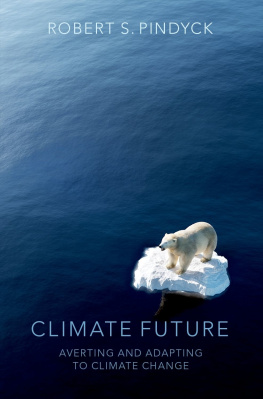
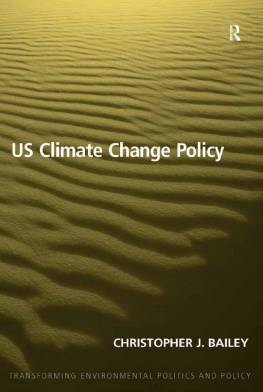

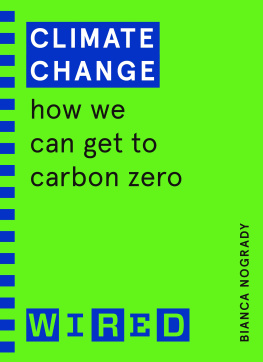
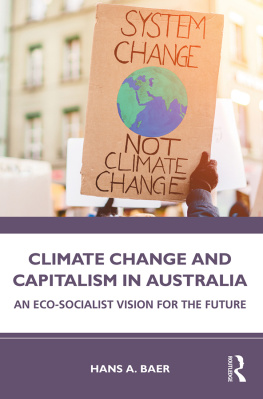
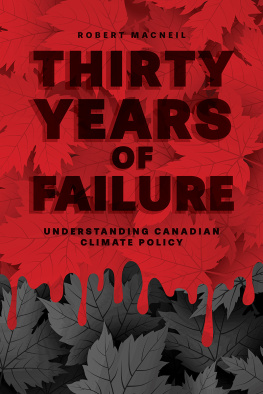
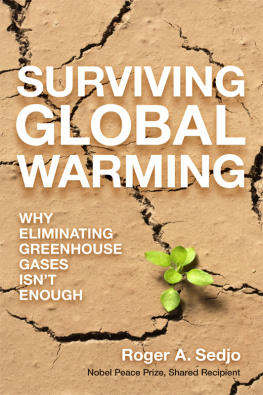
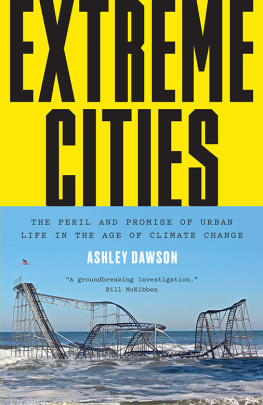


 emissions, the following things will happen, as though we actually knew what will happen. Rarely do we read or hear that those things might happen; instead were told they will happen. Naturally, we humans prefer certainty to uncertainty, and feel uncomfortable when we dont know what lies ahead. Most people prefer to hear or read statements of the sort By 2050 the temperature will rise by 3 and sea levels will rise by 5 meters," as opposed to there is a 30-percent chance that temperature will rise by 3 or more, and a 70-percent chance it will rise by less than 3." But as distressing as it might be, the simple fact is that the climate outcome," by which I mean the extent of climate change and its impact on the economy and society more generally, is far more uncertain than most people think.
emissions, the following things will happen, as though we actually knew what will happen. Rarely do we read or hear that those things might happen; instead were told they will happen. Naturally, we humans prefer certainty to uncertainty, and feel uncomfortable when we dont know what lies ahead. Most people prefer to hear or read statements of the sort By 2050 the temperature will rise by 3 and sea levels will rise by 5 meters," as opposed to there is a 30-percent chance that temperature will rise by 3 or more, and a 70-percent chance it will rise by less than 3." But as distressing as it might be, the simple fact is that the climate outcome," by which I mean the extent of climate change and its impact on the economy and society more generally, is far more uncertain than most people think. and other greenhouse gases, but by how much and how fast? Enough to prevent a temperature increase greater than 1.5 or 2.0 by the end of the century? What if, despite our best efforts, we are simply unable to reduce emissions enough to prevent a temperature increase of 2 or more? What then? Do we just wave our hands and say Too bad"? And if today we think that there is a strong possibility that (despite our best efforts) we are likely to experience a temperature increase greater than 2, what should we do?
and other greenhouse gases, but by how much and how fast? Enough to prevent a temperature increase greater than 1.5 or 2.0 by the end of the century? What if, despite our best efforts, we are simply unable to reduce emissions enough to prevent a temperature increase of 2 or more? What then? Do we just wave our hands and say Too bad"? And if today we think that there is a strong possibility that (despite our best efforts) we are likely to experience a temperature increase greater than 2, what should we do? emission reductions. Some countries (e.g., the U.S. and Europe) may meet their targets, but other countries (China, India, Indonesia, Russia, ) will not, and may not even set targets. In fact, even the most optimistic projections of
emission reductions. Some countries (e.g., the U.S. and Europe) may meet their targets, but other countries (China, India, Indonesia, Russia, ) will not, and may not even set targets. In fact, even the most optimistic projections of  emission reductions imply a substantial buildup of
emission reductions imply a substantial buildup of  in the atmosphere, and as a result a gradual increase in temperatures worldwide.
in the atmosphere, and as a result a gradual increase in temperatures worldwide.